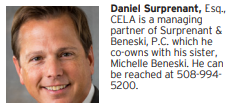Daniel Surprenant, Esq., CELA
Depending on how they are drafted, trusts can offer a way to leave a legacy, protecting assets while avoiding the costs of probate, as part of your estate planning. Probate is the court process in which assets may be delegated to certain individuals at death. This process can cost thousands of dollars and is time consuming. A trust is one way to avoid probate and to ensure that your loved ones receive the maximum value from your estate and assets. That same trust can protect assets from long term care costs, keep assets away from in-laws, lawsuits and divorces, and even minimize estate tax.
What is included in a Trust?
A trust can own almost anything, ranging from your real estate and life insurance settlement to cash and investments. Trusts vary in size, complexity and in benefits. Different trusts have different requirements.
What is a Trustee?
A trustee is the person you, as the grantor, have designated to be in charge of the assets in your trust, usually when you pass or become incapacitated. This individual has fiduciary responsibilities including to prudently manage your trust assets and to distribute them according to the terms of your trust.
Benefits of Creating a Trust
Trusts offer a variety of benefits including protecting your assets from lawsuits and probate fees. Here are some important benefits from having a trust:
Protection: You can design your trust to protect your assets from the potential lawsuits and/or divorce of your children. This is especially important for beneficiaries who are in professions known for litigation such as doctors and lawyers. Also, the trust can avoid probate. Probate is a public process in which anyone can see the Will and also the probate assets. Any creditors are paid off and if the individual has probate assets in multiple states, probate fees will be assessed in each state. Probate fees are often $4,000 to $8,000 and sometimes more. This cost is in addition to any estate tax and income tax that may be imposed.
However, assets in trust will avoid the cost and delay of probate, and also can minimize risk of challenge of the document or family fighting.
Flexibility: Trusts offer options to provide for beneficiaries in different ways. For instance, you can designate funds to be distributed for education or medical support, or decide at what age or interval the funds can be distributed. Prudent Investment Strategy: The trustee has a fiduciary responsibility to oversee the management of trust funds honestly and accurately by law. This may mean keeping the cash assets owned by a trust in an interest-bearing account for growth, and having regular assessment of the investments, risk, return and diversification. Your trustee can seek assistance from a professional investment advisor.
Legacy: Having a trust offers you a way to leave a legacy in an ongoing way for the people, organizations and beliefs that you hold dear. You can designate exact amounts of contributions and any guidelines for distributing your assets. Setting up a Trust: When and if you decide that a trust will benefit your family, you should meet with a qualified estate planning attorney. You should choose an estate planning attorney who has sufficient experience and works well with you to determine your needs, goals and family situation. You (and your attorney) can also work with an investment advisor regarding allocation of funds to your beneficiaries.
Other Considerations: In order to plan properly for when and if you become incapacitated, you should consider other foundational estate planning documents, including a durable power of attorney, selecting an individual you choose to make decisions regarding your finances if you are not in a position to do so. It is always better to be prepared ahead of time than to leave your loved ones without a clear plan or control over your assets.
Lastly, you will also need to periodically revisit this plan as your goals or assets may change, as well as to review any changes in the law that may affect your distributions. With a trust, will and foundational documents in place, you can enjoy the peace of mind of knowing that your goals have been achieved, including asset protection for your loved ones.

Preserving and Protecting Your Assets with A TRUST

Select to Read Similar Content:




















